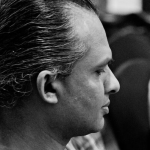A game changer for wellbeing
In this blog, Hiten gives some insight on the recently launched Wellbeing Cluster in the Philippines, which he believes can catalyse a shift in the way the humanitarian sector addresses and manages the wellbeing and mental health support for aid workers.
The 30th of July 2018 marked a significant milestone in the way we prioritise and support the mental health and wellbeing of our workers, indeed ourselves, within the humanitarian sector: In Cebu, in the Philippines, the very first dedicated ‘Wellbeing Cluster’ was officially launched.
As a new model, or infrastructure, within the humanitarian architecture, it potentially represents the first of many Wellbeing Clusters envisioned, nationally, regionally, and globally, forming a living network of pooled knowledge, expertise, services and resources. The platform provides a localised and relevant grassroots-led model, which has the potential to challenge the status quo, and to catalyse a shift in the way the humanitarian sector addresses and manages the wellbeing and mental health support for aid workers.
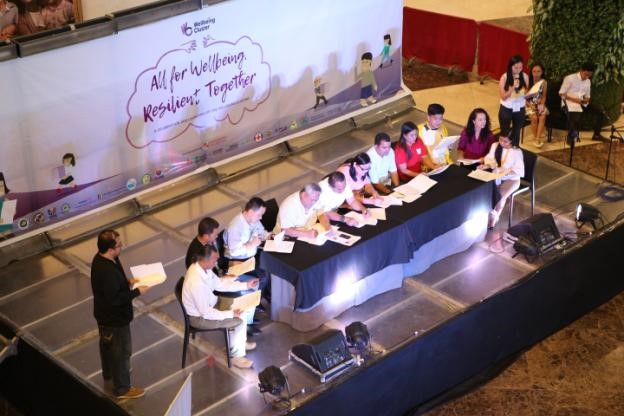
It’s about time as numerous research show that humanitarian workers are especially exposed to stress, anxiety and trauma and experience burnout at some point, which has an impact on their mental health, wellbeing and the ability to do their jobs effectively.1
This is where the Wellbeing Cluster model has the potential to become an important component in the humanitarian architecture, and a way that can mainstream mental health and wellbeing, not only for ourselves, but also for the communities we support.
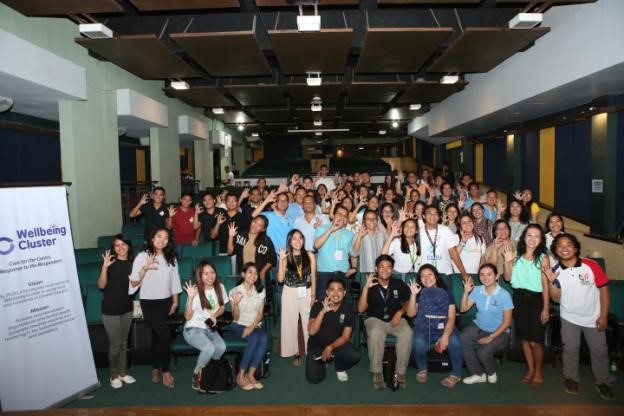
Call to arms
The name ‘cluster’ was intentionally hijacked from the UN cluster system, and deliberately used as a ‘benign provocation’, as a way of highlighting, and as a ‘call to arms’, for the need to prioritise and address the chronic levels of mental illness in the sector. However, it will work very differently to the UN model, and be a permanent and sustainable platform, not just in times of emergencies.
As an endeavour of the Mindfulness & Wellbeing component of the Transforming Surge Capacity project, and part of the Start Network’s portfolio of projects under the Disasters and Emergencies Preparedness Programme (DEPP) funded by UK Aid, the launch was the culmination of over a year of intense commitment, dedication, and effort by a group of local and international stakeholders to bring the vision to life. Chief amongst these, and providing inspired local leadership, are the Central Visayas Network of NGOs (CENVISNET) and the Ramon Aboitiz Foundation Inc. (RAFI), both based in Cebu, who have been instrumental in taking the global vision and making it a reality on the ground.
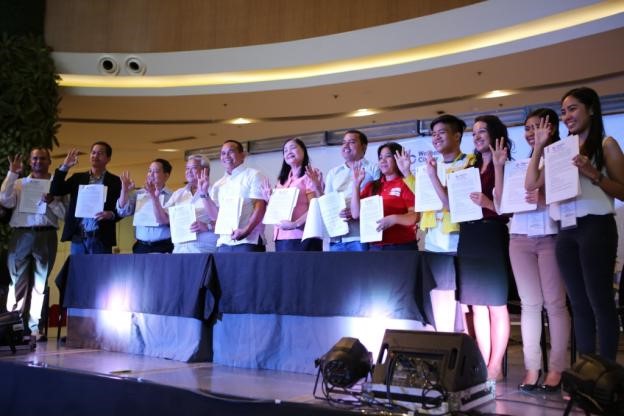
The core aim of this pioneering project is to create and pilot the cluster as a dedicated multi-stakeholder platform that brings humanitarian agencies from across the Philippines together to prioritise the wellbeing of aid workers. The key aspect of wellbeing, defined together internally, is on supporting mental health specifically. More importantly, the Wellbeing Cluster is also working closely with communities, so that in partnership, we may ultimately break stigma and taboo together, and help bring clarity around mental health, and build wellbeing and resilience with our beneficiaries. In this way, it has the potential to elevate the wellbeing and resilience of entire communities, and to create open and accepting environments to tackle mental illness more effectively.
In addition, the Cebu Wellbeing Cluster will also be focused on supporting social workers, first responders, carers, and communities during ‘peacetime’ periods, and not only when preparing and dealing with major humanitarian crises. For example, social workers working within the Department of Social Welfare & Development (DSWD), who work with vulnerable families affected by poverty, as well as the chronic drug affected communities, will benefit from training on stress reduction, as well as mindfulness-based approaches to develop self-awareness to mitigate stress, anxiety and depression, and to help nurture mental wellbeing.
A simple vision
The Wellbeing Cluster being piloted in Cebu, may potentially be the first of three major localized clusters across the Philippines, and perhaps, even, globally. Indeed, discussions are already underway, and look promising, in replicating the model in Luzon, in the northern part of the Philippines.
In its simplest form, ‘clusters’ will link local and national NGOs, with INGOs, governmental departments, academia, youth organisations, private sector, CSOs, and other key stakeholders to work together in strategically building the capacity of both individuals and organisations in all aspects of wellbeing related to mental health.
For example, the Cebu Cluster has already been recognised and integrated into the Department of Health, and initial resources have been allocated to further operationalise it. The University of San Carlos, Ateneo de Manila University, London South Bank University, and Oxford Brookes University have also linked with the Wellbeing Cluster, and are working together on various research to map out mental health needs and to pool knowledge, resources, and services around mental health and psychosocial support. In addition, the Humanitarian Leadership Academy, Plan International, Philippines Red Cross, a large number of local NGOs, and of course, Action Against Hunger UK and Philippines as the lead agency are working in collaboration.
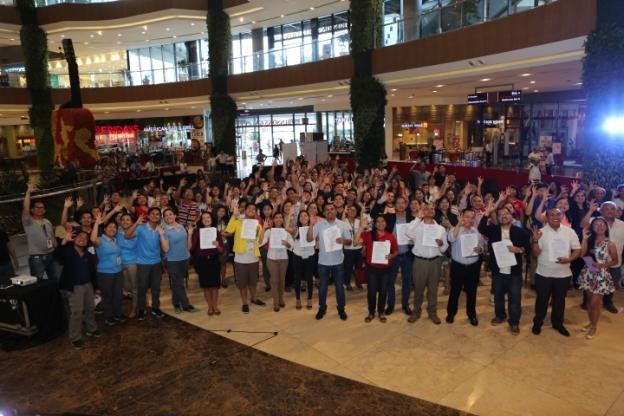
The multi-agency approach is also pragmatic, as it is altruistic, and means that costs can potentially be reduced, training can be quality controlled and made more consistent, and the capacity of organisations can be increased via, for example, the promotion of wellbeing policies, training of trainers, monitoring and evaluation frameworks for wellbeing, and protocols around good practice. For small agencies, and CBOs, this means that high quality training and services will be accessible, allowing for the elevation of practices and capacity on wellbeing for entire communities.
The localized approach also means that the wellbeing needs can be contextualized where appropriate, and that cultural taboos and stigma around mental illness may also be challenged appropriately. Importantly, the localized ‘cluster’ approach means that individuals and organisations can connect and grow together in challenging and catalyzing mental health issues, and in building capacity together as a community, rather than in isolated pockets. This working together may allow for greater coordination before, during and after a crisis or disaster.
Importantly, the focus on prevention and preparedness is a key emphasis for the wellbeing clusters, as it links directly to building capacity and resilience at both individual and organizational level, and to ensure that agreements and coordination mechanisms are agreed prior to a disaster or crisis occurring. This emphasis on preparedness may ensure that the wellbeing support is prioritized and made available to personnel at the grassroots level during emergencies, further supporting resilience and in mitigating stress and trauma where possible.
Extending the network
As the Cebu Wellbeing Cluster now begins to operate, several key working groups have now been organised to begin the important work of delivering services, designing training materials and resources, communicating and advocating on mental health, conducting academic research, mapping needs, and in developing strategies for both ‘peacetime’ and humanitarian phases of response.
Additionally, the Cebu Wellbeing Cluster is now at an important stage, and it is paramount that the lessons learned thus far, and in the preceding months, are captured and documented. This learning process is also a key component of the ongoing work, and will help to establish guidelines and templates, as well as support services and resources. These will be an important resource for supporting the replication of the cluster model, not only to the potential Luzon cluster being explored currently, but for potential clusters regionally and globally.
In parallel, Action Against Hunger UK has begun work, and will shortly be developing the UK Wellbeing Cluster. This will be based on the same principles, but will form a global approach, with a focus on advocacy, training and resource development, research, and innovation. A group of core agencies, experts, and other professionals, that were involved in the Mindfulness & Wellbeing project component will shortly begin working together to establish the cluster this autumn.
The UK and Cebu Wellbeing Cluster working groups will also be connected, and establish a global and local link, so that the policies and protocols being developed have a genuinely collaborative and relevant focus, that can take jointly developed core principles, and ensure that these are contextualised and relevant to local clusters in the different countries as per need.
A movement for change
As the data and survey findings on the chronic stress and trauma within the humanitarian sector is increasingly revealing, the need to address and prioritise mental wellbeing in the sector is now critical. If we are not acting now, when The Guardian reports that 79% of staff have reported a ‘mental health issue’, at what actual percentage figure will we feel it appropriate to do so, and at the scale required, as a sector?
It can be argued faultlessly, that we cannot, and should not, as a sector, wait for a major incident to knee-jerk us into a reaction, as we seem to have done for duty of care previously, and for safeguarding more recently. If an individual’s performance is significantly affected by mental ill health, the implications for our organisational performance, and indeed our impact as a sector for our beneficiaries, will inevitably be affected.
The creation of the first wellbeing cluster in Cebu offers a potentially practical and tangible opportunity for agencies to address, mainstream, collaborate, mitigate, and positively change the way in which mental health is managed in the humanitarian sector.
The approach may be new, but the need definitely is not. As such, the creation of the wellbeing cluster in Cebu is an important and significant first step towards a better way to support the mental health and wellbeing of our workers, not only in the Philippines, but perhaps globally also.
1 For example see: ‘Guardian research suggests mental health crisis among aid workers’ (2015) – The Guardian. https://www.theguardian.com/global-development-professionals-network/2015/nov/23/guardian-research-suggests-mental-health-crisis-among-aid-workers; Connorton, E., Perry, M. J., Hemenway, D., & Miller, M. (2011). Humanitarian relief workers and trauma-related mental illness. Epidemiologic reviews, 34(1), 145-155.

